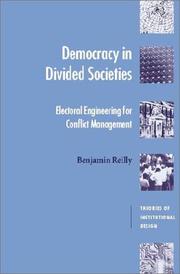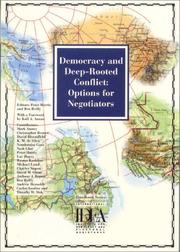| Listing 1 - 10 of 11 | << page >> |
Sort by
|

ISBN: 0521793238 0521797306 0511016956 0511047266 0511174357 1280433027 051115416X 0511328281 0511491107 110712218X 9780511016950 9780511154164 9780521793230 9780511491108 9786610433025 661043302X 9780521797306 9780511047268 9780511174353 9781280433023 9780511328282 Year: 2001 Publisher: Cambridge Cambridge University Press
Abstract | Keywords | Export | Availability | Bookmark
 Loading...
Loading...Choose an application
- Reference Manager
- EndNote
- RefWorks (Direct export to RefWorks)
Democracy is inherently difficult in societies divided along deep ethnic cleavages. Elections in such societies will often encourage 'centrifugal' politics which reward extremist ethnic appeals, zero-sum political behaviour and ethnic conflict, and which consequently often lead to the breakdown of democracy. Reilly examines the potential of 'electoral engineering' as a mechanism of conflict management in divided societies. He focuses on the little-known experience of a number of divided societies which have used preferential, vote-pooling electoral systems - such as Papua New Guinea, Sri Lanka, Northern Ireland and Fiji. Examination of these cases shows that electoral systems which encourage bargaining between rival political actors, which promote the development of broad-based, aggregative political parties and which present campaigning politicians with incentives to attract votes from a range of ethnic groups can, under certain conditions, encourage the development of moderate, accommodatory political competition in divided societies.
Political systems --- Elections --- Conflict management --- Gestion des conflits --- Conflict management. --- Democracy. --- Democracy - Case studies. --- Elections. --- Government - General --- Law, Politics & Government --- Political Institutions & Public Administration - General --- Democracy --- #SBIB:014.AANKOOP --- #SBIB:324H42 --- #SBIB:324H71 --- Self-government --- Political science --- Equality --- Representative government and representation --- Republics --- Conflict control --- Conflict resolution --- Dispute settlement --- Management of conflict --- Managing conflict --- Management --- Negotiation --- Problem solving --- Social conflict --- Crisis management --- Electoral politics --- Franchise --- Polls --- Politics, Practical --- Plebiscite --- Political campaigns --- Politieke structuren: verkiezingen --- Politieke verandering: modernisatie, democratisering, regional development --- Social Sciences --- Political Science --- Elections - Case studies --- Conflict management - Case studies --- Democracy - Case studies
Book
ISBN: 9780821445402 0821445405 9780821421819 0821421816 9780821421826 0821421824 Year: 2015 Publisher: Athens : Ohio University Press,
Abstract | Keywords | Export | Availability | Bookmark
 Loading...
Loading...Choose an application
- Reference Manager
- EndNote
- RefWorks (Direct export to RefWorks)
"In Slavery, Agriculture, and Malaria in the Arabian Peninsula, Benjamin Reilly illuminates a previously unstudied phenomenon: the large-scale employment of people of African ancestry as slaves in agricultural oases within the Arabian Peninsula. The key to understanding this unusual system, Reilly argues, is the prevalence of malaria within Arabian Peninsula oases and drainage basins, which rendered agricultural lands in Arabia extremely unhealthy for people without genetic or acquired resistance to malarial fevers. In this way, Arabian slave agriculture had unexpected similarities to slavery as practiced in the Caribbean and Brazil. This book synthesizes for the first time a body of historical and ethnographic data about slave-based agriculture in the Arabian Peninsula. Reilly uses an innovative methodology to analyze the limited historical record and a multidisciplinary approach to complicate our understandings of the nature of work in an area that is popularly thought of solely as desert. This work makes significant contributions both to the global literature on slavery and to the environmental history of the Middle East--an area that has thus far received little attention from scholars"--
Slavery --- Africans --- Ethnology --- Abolition of slavery --- Antislavery --- Enslavement --- Mui tsai --- Ownership of slaves --- Servitude --- Slave keeping --- Slave system --- Slaveholding --- Thralldom --- Crimes against humanity --- Serfdom --- Slaveholders --- Slaves --- History. --- Agricultural laborers --- Malaria --- Agriculture --- Oases --- Deserts --- Farming --- Husbandry --- Industrial arts --- Life sciences --- Food supply --- Land use, Rural --- Ague --- Chills and fever --- Intermittent fever --- Malarial fever --- Fever --- Protozoan diseases --- Agricultural workers --- Farm labor --- Farm laborers --- Farm workers --- Farmhands --- Farmworkers --- Employees --- Enslaved persons --- Persons --- Social aspects --- Health aspects --- Environmental aspects --- Arabian Peninsula --- Arabia --- Environmental conditions
Book
ISBN: 0786436557 9780786436552 Year: 2009 Publisher: Jefferson (N.C.): McFarland,
Abstract | Keywords | Export | Availability | Bookmark
 Loading...
Loading...Choose an application
- Reference Manager
- EndNote
- RefWorks (Direct export to RefWorks)
Book
ISBN: 9781476688091 9781476646893 Year: 2022 Publisher: Jefferson, N.C. McFarland & Company, Inc.
Abstract | Keywords | Export | Availability | Bookmark
 Loading...
Loading...Choose an application
- Reference Manager
- EndNote
- RefWorks (Direct export to RefWorks)
Book
ISBN: 9781476643953 Year: 2022 Publisher: Jefferson : McFarland & Company, Incorporated Publishers,
Abstract | Keywords | Export | Availability | Bookmark
 Loading...
Loading...Choose an application
- Reference Manager
- EndNote
- RefWorks (Direct export to RefWorks)
"During the last millennium and a half, Rome was the inspiration of artists, the coronation stage of German emperors, the distant desire of pilgrims, and the seat of the Roman popes. Yet Rome also lies within the northern range of P. falciparum malaria, the deadliest strain of the disease, against which northern Europeans had no intrinsic or acquired defenses. As a result, Rome lured a countless number of unacclimated transalpine Europeans to their deaths in the period from 500 to 1850 AD. This book examines how Rome's allure to European visitors and its resident malaria species impacted the historical development of Europe. It covers the environmental and biological factors at play and focuses on two of the periods when malaria potentially had the greatest impact on the continent: the heyday of the medieval German Empire and its conflicts with the papacy (c. 800-1300) and the Protestant Reformation (c. 1500). Through explorations into the history of religion, empire, disease, and culture, this book tells the story of how the veritable capital of the world became the graveyard of nations"--
Malaria --- Travelers --- Travel --- History. --- Health aspects --- Rome (Italy) --- Environmental conditions. --- History
Book
ISBN: 9781032566221 Year: 2024 Publisher: London : Taylor & Francis,
Abstract | Keywords | Export | Availability | Bookmark
 Loading...
Loading...Choose an application
- Reference Manager
- EndNote
- RefWorks (Direct export to RefWorks)
Disasters in World History surveys the development of disaster studies as a discipline as well as the historical case studies and theories used by historians to understand disasters.
Book
ISBN: 9789280811575 9280811576 9789280871265 9280871269 Year: 2008 Publisher: Tokyo United Nations university press
Abstract | Keywords | Export | Availability | Bookmark
 Loading...
Loading...Choose an application
- Reference Manager
- EndNote
- RefWorks (Direct export to RefWorks)
Political parties --- Partis politiques --- #SBIB:324H43 --- #SBIB:324H71 --- 841.3 Politieke bewegingen --- 856.1 Conflictpreventie --- Parties, Political --- Party systems, Political --- Political party systems --- Political science --- Divided government --- Intra-party disagreements (Political parties) --- Political conventions --- Politieke structuren: politieke partijen --- Politieke verandering: modernisatie, democratisering, regional development

ISBN: 9189098226 Year: 2003 Publisher: Stockholm International IDEA
Abstract | Keywords | Export | Availability | Bookmark
 Loading...
Loading...Choose an application
- Reference Manager
- EndNote
- RefWorks (Direct export to RefWorks)
Digital
ISBN: 9780821445402 Year: 2015 Publisher: Athens Ohio University Press
Abstract | Keywords | Export | Availability | Bookmark
 Loading...
Loading...Choose an application
- Reference Manager
- EndNote
- RefWorks (Direct export to RefWorks)
This book illuminates a previously unstudied phenomenon: the large-scale employment of people of African ancestry as slaves in agricultural oases within the Arabian Peninsula. The key to understanding this unusual system is the prevalence of malaria within Arabian Peninsula oases and drainage basins, which rendered agricultural lands in Arabia extremely unhealthy for people without genetic or acquired resistance to malarial fevers. In this way, Arabian slave agriculture had unexpected similarities to slavery as practiced in the Caribbean and Brazil. This book synthesizes a body of historical and ethnographic data about slave-based agriculture in the Arabian Peninsula. Reilly uses an innovative methodology to analyze the limited historical record and a multidisciplinary approach to complicate our understandings of the nature of work in an area that is popularly thought of solely as desert.
Book

ISBN: 1626374058 9781626374058 9781588265708 1588265706 Year: 2022 Publisher: Boulder
Abstract | Keywords | Export | Availability | Bookmark
 Loading...
Loading...Choose an application
- Reference Manager
- EndNote
- RefWorks (Direct export to RefWorks)
Assessing the trajectory of democratization in East Asia, this volume offers a systematic and tightly integrated analysis of party-system development in countries across the region. The authors utilize unprecedented cross-national survey data to examine the institutional structure of party systems, the range of choices these systems represent, and their connection to voting preferences. They also investigate the consequences of partisanship for citizen support of the democratic process. While revealing that party development in the region is still incomplete, the book highlights areas of progress as it explores the potential for enhanced representation.
Political parties --- Democratization --- Democratic consolidation --- Democratic transition --- Political science --- New democracies --- Parties, Political --- Party systems, Political --- Political party systems --- Divided government --- Intra-party disagreements (Political parties) --- Political conventions --- East Asia --- Asia, East --- Asia, Eastern --- East (Far East) --- Eastern Asia --- Far East --- Orient --- Politics and government --- Partis politiques --- Démocratisation --- Extrême-Orient --- Politique et gouvernement
| Listing 1 - 10 of 11 | << page >> |
Sort by
|

 Search
Search Feedback
Feedback About UniCat
About UniCat  Help
Help News
News